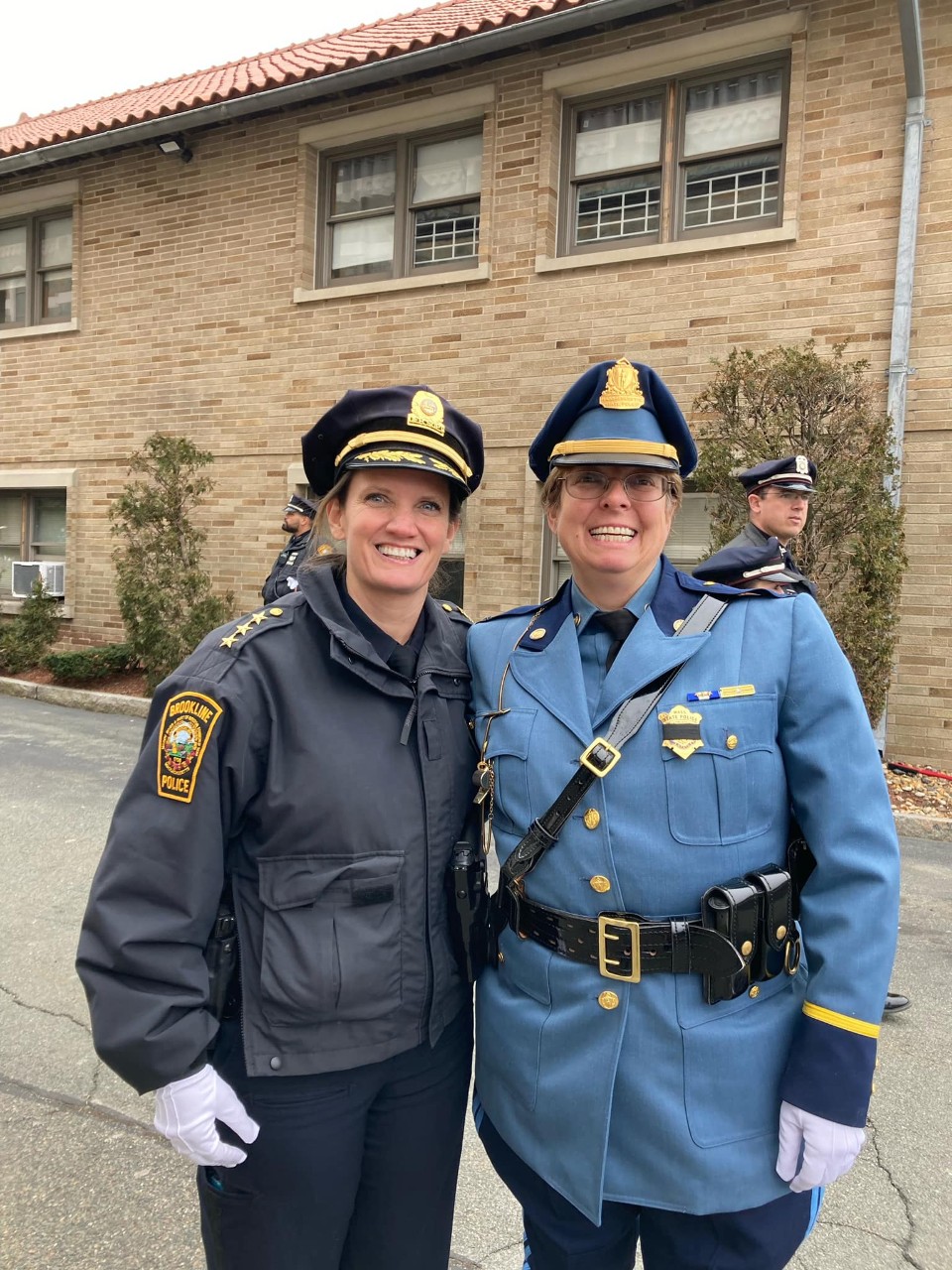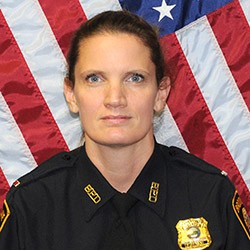
Jennifer Paster, MSW’24, left, and a colleague. Courtesy photo.
A part-time student in the Boston College School of Social Work has made history, becoming the first woman to hold the title of chief of police for the town of Brookline, Massachusetts.
Jennifer Paster was promoted from deputy superintendent of the Brookline Police Department to acting chief of police at the end of August.
As a third-year student on the mental health track, she says that her training as a social worker has prepared her for her new role in several unexpected ways.
“I came in with a plan to eventually retire as a police officer and start a second career doing clinical work with first responders who have experienced trauma,” says Paster, who has served as a Brookline police officer since 2000. “But right out of the gate I was able to apply what I was learning in classes to the work that I was doing as a police officer and as a supervisor in a law enforcement agency.”
As Paster settled into her new position, she reflected on her historic achievement, her decision to get an MSW, and her longstanding interest in mental health.
How does it feel to be the first woman to hold the title of chief of police for Brookline?
It’s an honor. I just hope I’m not the last. I feel silly taking the credit for it. To put it in perspective, when I started as a police officer in 2000, I got to work with the first-ever female police officer in Brookline. So I feel like we’ve really made a lot of strides in a relatively short amount of time. And so it’s an honor. But most of the hard work was done by people before me.
How has your training at the Boston College School of Social Work helped to prepare you for this role?
It has prepared me in so many ways—and so many unanticipated ways. When I decided to enroll, I came in with a plan to eventually retire as a police officer and start a second career doing clinical work with first responders who have experienced trauma. But right out of the gate I was able to apply what I was learning in classes to the work that I was doing as a police officer and as a supervisor in a law enforcement agency, working with employees from very diverse backgrounds and life experiences.
I was able to immediately implement some of what I was learning into department policies, specifically around jail diversion and alternatives to arrest. Times are different now, and law enforcement’s constantly evolving to better meet the needs of the community. But when I first started, we were at the end of the War on Drugs era, and we were locking people up for marijuana possession. Now I’m thinking about what actually makes sense so that we can lower the recidivism rate. And we really want to work with people in the community and local agencies in a way that makes sense. I like to think about our police department less as strictly law enforcement and more about public safety and help push that forward.
What courses and professors have been particularly influential?
I have loved every class I’ve taken. Right out of the gate, I took “Rethinking Diversity: Systems of Oppression and Privilege” with Melissa Bartholomew. It was a great way to kick off my social work journey. I have a ton of respect for her, she really kept the entire class engaged, and it felt like we became a very close knit group based on the shared experience of having her as a teacher. I’ve also taken Yvonne Castañeda’s “Social Welfare Systems” course and I am still in contact with her today. I think she has a great style of incorporating storytelling into her lessons. She does a really good job of explaining issues around cultural diversity with regard to police and mental health responses.
You co-founded the Brookline Police Department’s Crisis Intervention Team, a unit that is specially trained to respond to people with acute mental health needs. How have your courses and fieldwork at BCSSW helped you train police officers to recognize mental illness and de-escalate potentially violent incidents?
I did my first field placement with the Greater Boston Law Enforcement Critical Incident Stress Management Team, [counseling officers from different police departments in the region who have experienced traumatic events]. The team is incident-driven, so, for example, say an officer-involved shooting occurs in another jurisdiction. I’d go out, sit down with the officers that were involved, ideally before they go home from their shift, and then, if necessary, go back a few days later for more of a formal debriefing.
I also just started taking “Public Health Social Work” with Summer Hawkins, and I think that is the course I’m most excited to take this semester. It’s kind of perfect for thinking about how systems work together—or don’t—and learning about the limitations of each system and where the gaps are.

Jennifer Paster. Courtesy photo.
The focus of that course seems to align nicely with the CIT program, which includes collaborations with community partners such as the Brookline School Department, the Brookline Housing Authority, and the Office of Veterans Affairs.
CIT really is a community program. We need to understand that one agency can’t do this kind of work by itself and recognize the importance of collaborations and relationships. That’s really what’s at the heart of the program.
You earned a bachelor’s degree in psychology and sociology in 1998 and a master’s degree in criminal justice administration in 2002. What made you return to school for your MSW?
It was sort of like a can of worms was opened when we started doing the CIT work. I was learning a lot from our partners and the more I learned, the more I wanted to know. I applied to BC as an undergrad, and I considered going, but I grew up in Brookline and it felt a little close to home. So I actually feel really lucky that I’m able to be a part of the BC community now, at a time that feels really right.
Your work as both a student and a police officer has focused on mental health. Why is mental health so important to you?
My perspective on it has changed as my career path has changed. When I was a younger officer working on the streets, working overnight, and interacting with people in the community, it was easy to get frustrated. Our only option at that time, really, as law enforcement officers was to wait until somebody required involuntary hospitalization to act. And on more than a few occasions, we would send somebody to the hospital and then before the end of our shift, see them at Dunkin’ Donuts, and that’s really frustrating. Over time, you come to realize the people you continue to see over and over again—you’re interacting with them less because of their criminal intent and more because their actions, which violate laws, are a result of untreated mental health conditions. So it goes back to just thinking smarter and figuring out how we really can help people.
You have received several awards for your work as the co-coordinator of CIT, including recognition from the Massachusetts chapter of the National Alliance on Mental Illness and the Massachusetts Department of Mental Health. What, over the course of your 22 years as a police officer, are you most proud of?
I feel fortunate to be in a position where I can affect policies, think about workplace dynamics, and make change in a way that leaves my officers better. Getting the peer support unit up and running and being on the ground floor of our Critical Incident Stress Management Team—that’s probably at this point what I’m most proud of. I think it’s sort of the equivalent of putting your own oxygen mask on first. And if I can take care of my officers, they’ll, in-turn, serve the community better.


